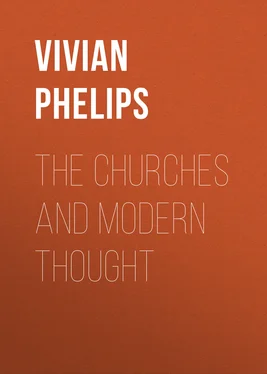Vivian Phelips - The Churches and Modern Thought
Здесь есть возможность читать онлайн «Vivian Phelips - The Churches and Modern Thought» — ознакомительный отрывок электронной книги совершенно бесплатно, а после прочтения отрывка купить полную версию. В некоторых случаях можно слушать аудио, скачать через торрент в формате fb2 и присутствует краткое содержание. Жанр: foreign_prose, foreign_religion, Философия, foreign_antique, на английском языке. Описание произведения, (предисловие) а так же отзывы посетителей доступны на портале библиотеки ЛибКат.
- Название:The Churches and Modern Thought
- Автор:
- Жанр:
- Год:неизвестен
- ISBN:нет данных
- Рейтинг книги:4 / 5. Голосов: 1
-
Избранное:Добавить в избранное
- Отзывы:
-
Ваша оценка:
- 80
- 1
- 2
- 3
- 4
- 5
The Churches and Modern Thought: краткое содержание, описание и аннотация
Предлагаем к чтению аннотацию, описание, краткое содержание или предисловие (зависит от того, что написал сам автор книги «The Churches and Modern Thought»). Если вы не нашли необходимую информацию о книге — напишите в комментариях, мы постараемся отыскать её.
The Churches and Modern Thought — читать онлайн ознакомительный отрывок
Ниже представлен текст книги, разбитый по страницам. Система сохранения места последней прочитанной страницы, позволяет с удобством читать онлайн бесплатно книгу «The Churches and Modern Thought», без необходимости каждый раз заново искать на чём Вы остановились. Поставьте закладку, и сможете в любой момент перейти на страницу, на которой закончили чтение.
Интервал:
Закладка:
I crave the reader’s patience while I give one more example of advanced apologetics. The Rev. Arthur Moorhouse, M.A., B.D., Tutor in Old Testament Languages and Literature at Didsbury College, offers, in a lecture 71 71 Fully reported in the Methodist Times .
delivered at Manchester on “The Inspiration of the Old Testament,” “an unhesitating and emphatic denial” to the statement that there is any “untruth in the Old Testament.” Yet he tells us that “the early chapters of Genesis are not historical in our modern and scientific sense,” and asks us to remember that, “in the nature of things, it could not be history, for it deals with facts which are, of necessity, prehistoric”! Such pitiful shifts and evasions seem to many of us wholly unworthy of earnest men. “Our fathers,” says Mr. Moorhouse, “may have thought that this was history miraculously dictated, but the Bible does not say so.” No, and the Bible does not say that it is speaking the truth, but “our fathers” were simple-minded enough to forget that such a guarantee was necessary on the part of a book which they, like Mr. Moorhouse, believed to be the inspired Word of God.
§ 4. Admissions by Orthodox Apologists
I cannot conclude this review of Bible criticism without an allusion to the opinions of those theologians who agree with the “Higher Critics” to an extent far exceeding anything the pious layman suspects. I shall omit, as being too advanced, the views of Dr. Driver, given in his “Genesis,” or of Canon Henson, as expressed in the Contemporary Review and in his book, The Value of the Bible and Other Sermons , or of Archdeacon Wilson, shown in his various interesting books and pamphlets; and will confine myself to comparatively conservative theology. I select, as representative of this type, The Divine Library of the Old Testament , by Dr. A. F. Kirkpatrick (Master of Selwyn College, Regius Professor of Hebrew in the University of Cambridge, and Canon of Ely Cathedral), and The Study of the Gospels , being a “Handbook for the Clergy,” by Dr. J. Armitage Robinson (Dean of Westminster).
In the former, which is among the books selected by the Christian Evidence Society for their Examination in March, 1907, we read: “The lectures do not attempt to deal with many of the graver questions which are being raised as to the Old Testament.” But it is just the more difficult questions, such as those examined with such destructive effect by the Higher Criticism, which specially require to be answered. Why are they neglected? The author goes on to confess that “the books were constructed out of earlier narratives; some were formed by the union of previous collections of poetry or prophecies; some betray marks of a reviser’s hand; and even books which bear the names of well-known authors in some cases contain matter which must be attributed to other writers.” Also we find the following significant admissions. Referring to the important last twenty-seven chapters of Isaiah, he accepts Dr. Driver’s criticisms, and says: “I do not see how we can resist the conclusion that these chapters were not written by Isaiah, but by an unknown prophet towards the close of the Babylonian Exile”; and he owns that “it will inevitably seem to many students of the Bible that, in assigning the prophecy to a date so near to the events which it foretells, we are detracting from its truly predictive character and diminishing its value.” However, he considers that “Isaiah is great enough to share his glory with this disciple, in whom, being dead, he yet spoke; and, paradox as it may seem, the truly prophetic character of the work gains by being referred to the time of the Exile.” By what process of reasoning he arrives at this astonishing conclusion it is exceedingly difficult to comprehend.
Further admissions by Dr. Kirkpatrick must be noticed more briefly. They are: “The first chapter of Genesis is not, as we now know, a scientifically exact account of Creation.” “The account of the Fall is, it may be, an allegory rather than a history in the strict sense of the term.” “The Deluge was not universal in the sense that the waters covered the whole surface of the entire globe.” “The Psalms, like the Proverbs, have a long literary history. They are poems by different authors, and David may be one of them.” “Modern criticism claims, and claims with justice, that the Hexateuch, like so many of the other books, is composite in its origin, and has a long literary history.” “That the Pentateuch was entirely written by Moses is merely a Jewish tradition, which passed into the Christian Church and was commonly accepted until modern times. [Yet how much hangs upon the trustworthiness of this same Jewish tradition, and how much else may not the Church have wrongfully accepted?] Some of the variations of the LXX. 72 72 The Greek version, known as the Septuagint (LXX.), made in Egypt in the third and second centuries B.C. for the use of the numerous body of Greek-speaking Jews and proselytes in that country.
from the Hebrew text are due, no doubt, to errors and interpolations and deliberate alterations; but after all allowance has been made for these, I do not see how any candid critic can resist the conclusion that many of them represent variations existing in the Hebrew text from which the translation was made.” “It was probably at the very beginning of this period [from the Fall of Jerusalem to the end of the fifth century], towards the close of the first century a.d., that the final settlement of an authoritative text took place.... How came it that all the copies containing other readings have disappeared?… Copies differing from it [the standard text] would die out or be deliberately destroyed.” “The oldest Hebrew MS. in existence of which the date is known was written in 916 A.D.— i.e. , separated by more than a thousand years from the latest of the works included in the Canon.”
Finally, the following crucial questions are offered (pp. 88–9) and left unanswered : “In what sense, it is asked, can this legislation, which is now said to be Mosaic in elemental germ and idea only, and to represent not the inspired deliverance of a supremely great individual, but the painful efforts of many generations of law-makers; these histories which have been compiled from primitive traditions, and chronicles, and annals, and what not; these books of prophecy which are not the authentic autographs of the prophets, but posthumous collections of such writings (if any) as they left behind them, eked out by the recollections of their disciples; these Proverbs and Psalms which have been handed down by tradition and altered and edited and re-edited; these histories which contain errors of date and fact, and have been, perhaps, ‘idealised’ by the reflection of the circumstances and ideas of the writer’s own times upon a distant past; these seeming narratives which may be allegories; and these would-be prophecies which may be histories; in what sense can these be said to be inspired ? The problems raised are grave.” My own thoughts, and the thoughts of many like myself, are here candidly expressed. I have nothing to add, and can only echo this learned divine’s solemn words—the problems raised are grave!
Turning now to the Study of the Gospels , we learn from Dr. Robinson as follows: There is no proof that St. Matthew is the author of the first Gospel. He is unable to fix the date himself, but quotes Dr. Harnack, who says “probably 70–75,” and who also adds the important reservation, “except certain later additions.” St. Mark’s authorship, he thinks, is practically certain, and the year 65 is the probable date. “It is,” he says, “exceedingly probable that St. Peter would not write or preach, even if he could speak at all, in any language but his mother tongue, the Aramaic of Galilee, a local dialect akin to Hebrew. When he wrote or preached to Greek-speaking people, he would use Mark or some other disciple as his interpreter.” What, then, may I ask, had become of the “gifts at Pentecost”?
Читать дальшеИнтервал:
Закладка:
Похожие книги на «The Churches and Modern Thought»
Представляем Вашему вниманию похожие книги на «The Churches and Modern Thought» списком для выбора. Мы отобрали схожую по названию и смыслу литературу в надежде предоставить читателям больше вариантов отыскать новые, интересные, ещё непрочитанные произведения.
Обсуждение, отзывы о книге «The Churches and Modern Thought» и просто собственные мнения читателей. Оставьте ваши комментарии, напишите, что Вы думаете о произведении, его смысле или главных героях. Укажите что конкретно понравилось, а что нет, и почему Вы так считаете.












